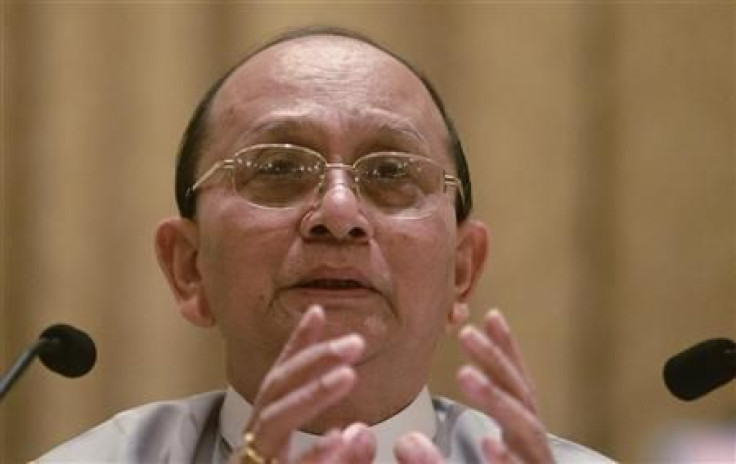Myanmar’s President Thein Sein Begins First European Tour To Strengthen Ties, Discuss Reforms

Myanmar President Thein Sein embarked on his first official European trip on Monday to strengthen ties and discuss the nation’s internal reforms, which have been marred by sectarian violence.
Thein Sein’s first stop is Norway, a non-EU state, followed by Finland, Austria, Belgium and Italy, news agencies reported, quoting Burmese officials.
The trip to Belgium would include both bilateral and “EU high-level meetings,” a European diplomat told the AFP.
The president visited the U.S. last year, becoming the first Burmese leader to do so in nearly half a century.
Addressing the U.N. General Assembly in New York in September, Thein Sein said that his country was on a path of change, from which it would not backtrack.
Thein Sein, 67, took office in March 2011, after the country's first election in 20 years in November 2010. Since then, he has led democratic reforms in Myanmar, which had been under the rule of a military junta, of which he had been a key member.
By-elections last April saw Aung San Suu Kyi’s National League for Democracy (NLD) win a landslide victory, and weeks later the former political prisoner was sworn into parliament.
Hundreds of political prisoners were freed between May 2011 and July 2012, and an amnesty was announced in September for 88 dissidents, but several hundred dissidents are still languishing in Myanmar's jails.
Though the reforms have not been comprehensive, the Western governments, including the U.S., the EU and Australia, responded to the progressive measures of Sein’s semi-civilian government by easing several sanctions that were put in place during the military rule, which has lasted since a 1962 military coup.
In April, the EU lifted all non-military sanctions on the Asian nation for a year during a visit by foreign policy chief Catherine Ashton. Later in the year, European Commission chief Jose Manuel Barroso offered Burma more than $100 million in development aid.
However, ethnic conflict that began last year, between the Buddhist and Muslim communities in western Myanmar's Rakhine state, has left close to 200 people dead and rendered more than 100,000 people -- most of them Muslim Rohingyas -- homeless, according to estimates by humanitarian groups.
In December, Myanmar’s troops launched an assault on ethnic Kachin insurgents, known as the Kachin Independence Army, or KIA, in the north-eastern part of the country, jeopardizing a peace initiative with Burma's minority groups. The KIA is fighting for autonomy for Kachin state within a federal Myanmar, a demand that successive governments have rejected.
President Thein Sein, who has been lauded for striking cease-fire agreements with various groups, has faced media attention after his public calls for troops not to launch offensives failed to contain the fighting.
Opposition leader Suu Kyi also visited Norway during a landmark European tour last June.
Thein Sein is expected back in Burma on Mar. 8.
© Copyright IBTimes 2024. All rights reserved.












